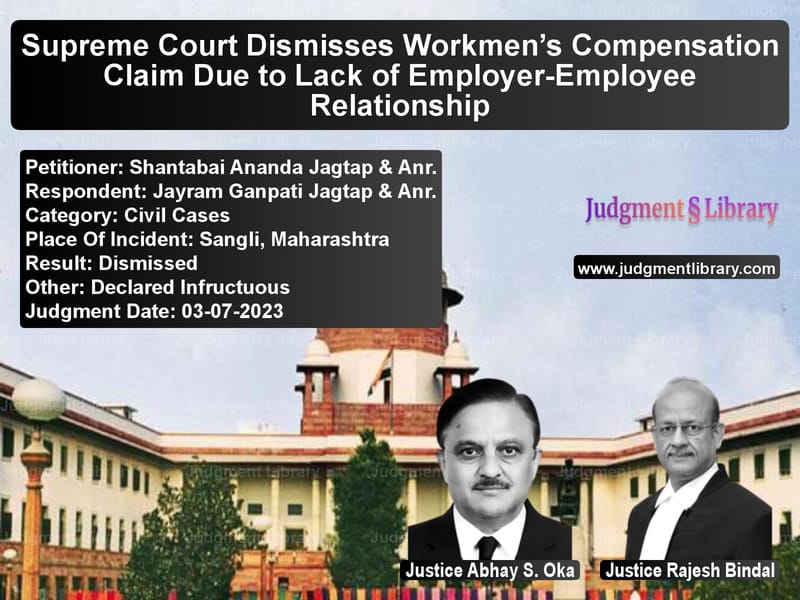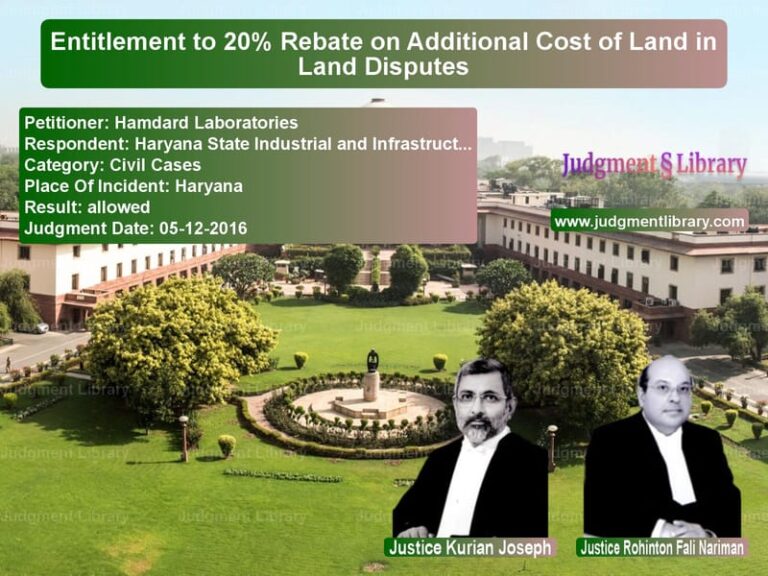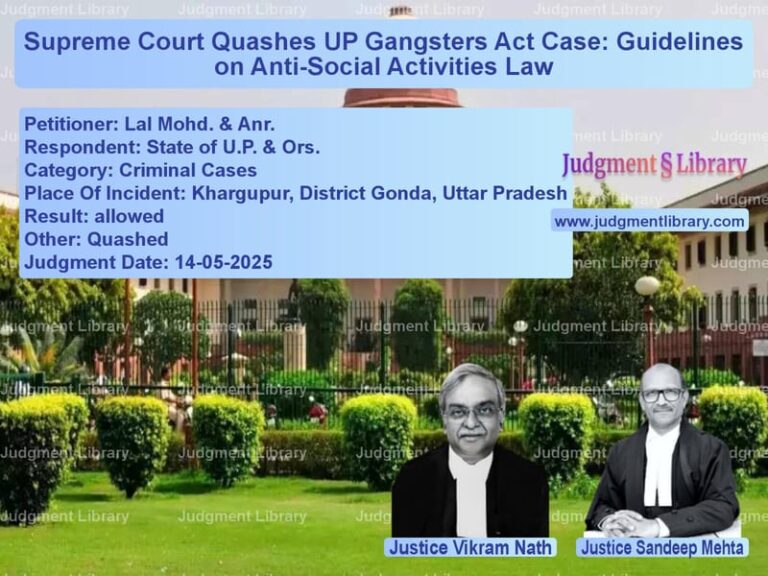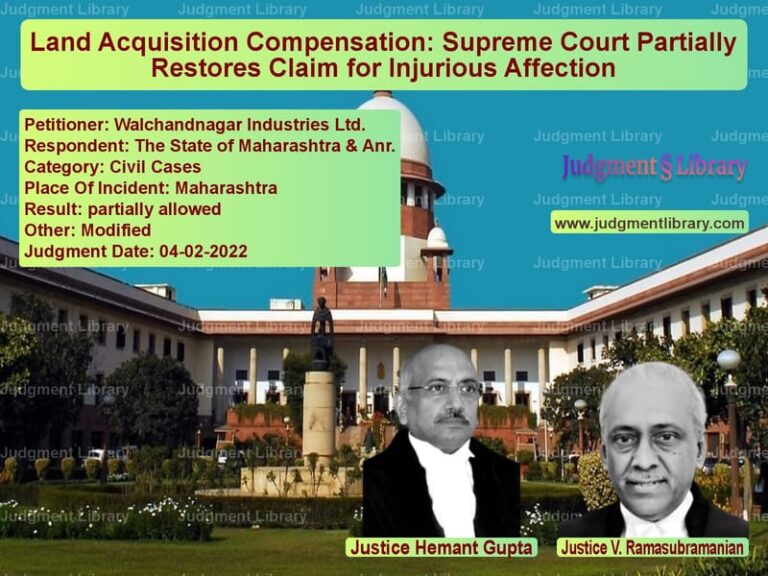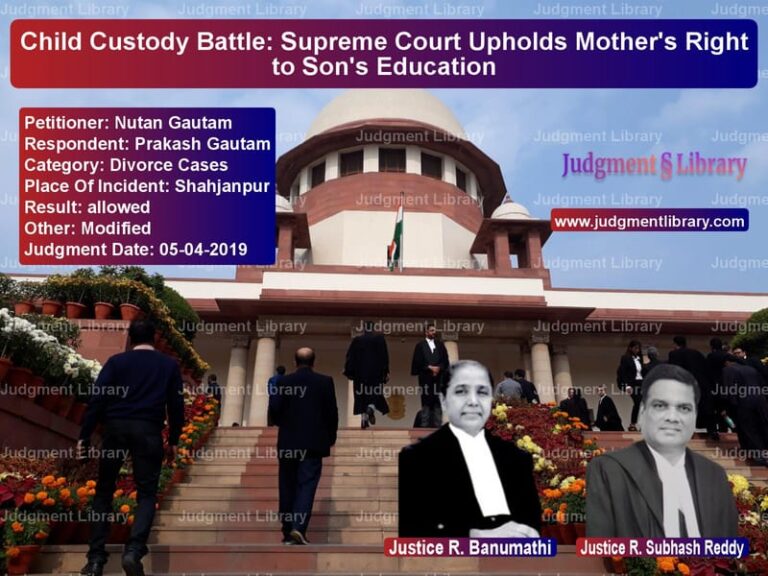Supreme Court Dismisses Workmen’s Compensation Claim Due to Lack of Employer-Employee Relationship
The Supreme Court recently ruled on a significant case involving workmen’s compensation under the Employees Compensation Act, 1923. The case, Shantabai Ananda Jagtap & Anr. vs. Jayram Ganpati Jagtap & Anr., revolved around the death of a driver in a road accident and the subsequent compensation claim filed by his legal heirs. The case highlights important legal principles regarding employer-employee relationships and the statutory limitation period for filing compensation claims.
Background of the Case
The case pertains to the death of Machindra Ananda Jagtap, who died in a road accident while driving Jeep No. MH-10-8363 on August 17, 1993. The vehicle was owned by Jayram Ganpati Jagtap and was insured with United India Insurance Co. Ltd.
The legal heirs of the deceased filed a claim under the Employees Compensation Act, 1923, asserting that the deceased was employed as a driver by the vehicle owner at the time of the accident. They sought compensation of ₹1,13,855, along with interest and penalties.
The claim application was filed on August 2, 2004, before the Commissioner for Workmen’s Compensation, Sangli, more than 9 years after the accident.
Decision by the Commissioner for Workmen’s Compensation
The Commissioner rejected the claim on two key grounds:
- Delay: The application was filed after an inordinate delay of over 9 years.
- Lack of Employer-Employee Relationship: The claimants failed to establish that the deceased was employed as a driver by the vehicle owner.
The Commissioner also noted that the claimants had already pursued compensation under the Motor Vehicles Act, 1988, and received an award, which made them ineligible to seek additional compensation under the Employees Compensation Act, 1923.
Appeal Before the Bombay High Court
The claimants appealed against the Commissioner’s decision before the Bombay High Court. The High Court:
- Held that the claim was maintainable despite the previous claim under the Motor Vehicles Act.
- However, upheld the Commissioner’s ruling on the issue of delay and lack of proof of employment.
Following this decision, the claimants moved the Supreme Court of India.
Key Legal Issues Before the Supreme Court
The Supreme Court was required to decide:
- Whether the delay of over 9 years in filing the claim could be condoned.
- Whether the claimants established an employer-employee relationship between the deceased and the vehicle owner.
- Whether the claimants were entitled to compensation under the Employees Compensation Act, 1923.
Arguments by the Appellants (Claimants)
The claimants contended that:
- The delay in filing the claim was due to their previous compensation claim under the Motor Vehicles Act, 1988.
- The deceased was employed by the vehicle owner as a driver and was earning a salary of ₹2,000 per month.
- The family had suffered significant financial hardship since the deceased was the sole breadwinner.
Arguments by the Respondents
The respondents, including the vehicle owner and the insurance company, argued:
- The deceased and the vehicle owner were related, as admitted by the claimants, and there was no documentary proof of an employer-employee relationship.
- The claimants had already received compensation under the Motor Vehicles Act and could not claim under the Employees Compensation Act.
- The delay of 9 years was inexcusable, and the claim should be dismissed on this ground alone.
Supreme Court’s Observations and Ruling
The Supreme Court, comprising Justices Abhay S. Oka and Rajesh Bindal, ruled in favor of the respondents and dismissed the claim. The Court made the following key observations:
1. No Employer-Employee Relationship Established
The Court noted:
“The claimants failed to provide any documentary evidence to establish that the deceased was employed as a driver by the vehicle owner. The salary certificate produced was not proved.”
Additionally, the claimants admitted in cross-examination that the deceased and the vehicle owner were part of a joint Hindu family and shared a common ration card.
2. Delay of 9 Years was Unreasonable
The Court emphasized:
“Once the claimants knew they were eligible to seek compensation under the Employees Compensation Act, there was no justification for waiting 9 years to file the claim.”
The Court also noted that the claimants approached the Commissioner only after they failed to execute the award under the Motor Vehicles Act.
3. No Relief for the Claimants
The Supreme Court concluded:
“The relationship of employer and employee has not been proved. The delay in filing the claim was excessive and unjustified. The appeal is accordingly dismissed.”
Final Judgment
The Supreme Court dismissed the appeal and upheld the findings of the lower courts. The claimants were not entitled to any compensation under the Employees Compensation Act, 1923.
Key Takeaways from the Judgment
- Claimants must establish a clear employer-employee relationship with documentary proof.
- Compensation claims should be filed within the statutory limitation period.
- Courts will not condone excessive delay unless justified with strong reasons.
- A claim under the Motor Vehicles Act does not automatically entitle claimants to compensation under the Employees Compensation Act.
Conclusion
The Supreme Court’s ruling in this case reinforces the importance of timely and well-substantiated claims under the Employees Compensation Act, 1923. The decision serves as a precedent for future compensation claims, ensuring that claimants meet the necessary legal requirements before seeking relief.
Petitioner Name: Shantabai Ananda Jagtap & Anr..Respondent Name: Jayram Ganpati Jagtap & Anr..Judgment By: Justice Abhay S. Oka, Justice Rajesh Bindal.Place Of Incident: Sangli, Maharashtra.Judgment Date: 03-07-2023.
Don’t miss out on the full details! Download the complete judgment in PDF format below and gain valuable insights instantly!
Download Judgment: shantabai-ananda-jag-vs-jayram-ganpati-jagta-supreme-court-of-india-judgment-dated-03-07-2023.pdf
Directly Download Judgment: Directly download this Judgment
See all petitions in Compensation Disputes
See all petitions in Negligence Claims
See all petitions in Worksite Accidents
See all petitions in Judgment by Abhay S. Oka
See all petitions in Judgment by Rajesh Bindal
See all petitions in dismissed
See all petitions in Declared Infructuous
See all petitions in supreme court of India judgments July 2023
See all petitions in 2023 judgments
See all posts in Civil Cases Category
See all allowed petitions in Civil Cases Category
See all Dismissed petitions in Civil Cases Category
See all partially allowed petitions in Civil Cases Category

